Vintage trucks are a hot segment of the collectible vehicle marketplace. Everyone wants a quaint old half-ton pickup in a bright color complete with wide whitewall tires, a small block Chevy, and an automatic transmission. Once they see the prices of such vehicles, their search grows wider. Once it gets into the three-quarter and one-ton sizes, interest starts to wane. Nobody seems to want them. So, what do you do with a commercial-size classic truck? That is the question for this 1936 Chevrolet one-ton-rated flatbed for sale on Facebook Marketplace in Whitesboro, Texas. This barn dust-coated former farm truck is in remarkably good shape despite certainly working hard for most of its life. With a low 38,000 miles on the odometer, it is likely this truck rarely left the confines of the farm. Can you think of a retirement gig for this truck so it can be spared the indignity of being unceremoniously parked out in front of an antique shop and slathered with pastel house paint? Or worse, having its cab, grille, and fenders removed to make a hot rod? Is the asking price of $14,000 reasonable? Thanks to T.J. for the one-ton tip!
Commercial trucks tend to have a very low survival rate. We see all manner of heavy-duty trucks on the highways today being used as basic transportation complete with jacked-up suspensions, fancy wheels and tires, and beds that will never see a bale of hay. These are called “bro-dozers,” and they are a fairly new phenomenon. Back in the day, you certainly didn’t pick a truck of this size and capacity for personal transportation if you could help it. These trucks were equipped with low gearing and massive springs to carry such heavy loads. They rode like the proverbial oxcart as a result and were only slightly faster. Owners used them and abused them until they could give no more. Rotting in the field or being hauled away by a scrapper was the fate of most of these honest workhorses.
Yet, out of a dusty Texas barn, emerges this 1936 Chevrolet one-ton flatbed truck. The seller tells us that this is a late 1936 model. The significance of this is that previous models used a lot of wood in the structure of the cab. Wood was used as the framework for bodies on most prewar cars, with the practice waning as stamping technology progressed. If you are a restorer, it is good news that you won’t have to deal with replacing the intricately shaped wood framework. Aftermarket suppliers for popular vehicles such as Model A Fords can supply pre-cut and shaped kits. Other vehicles have to rely on the ever-diminishing woodworking experts who specialize in such work. Technological advances may have a cure for this in the form of 3-D printing, but that hasn’t materialized yet.
The seller also tells us that this truck is complete and solid with a wonderful patina. Glimpses of the body show that the truck was originally painted a darker green color. Unfortunately, all the valuable barn dust is obscuring the condition of the existing paint. There don’t appear to be any surprises hidden under that rust. However, it is always good to see the true condition of the body before you invest in a phone call or a plane ticket. We can see that the truck will need six tires and a rather large trailer to cart it home.
A look inside reveals a very presentable interior. Given that we are so used to trucks so luxurious that their interiors would be standard fare in a Lincoln or Cadillac a few decades ago, this truck’s interior can only be described as spartan. Trucks of this size and vintage did not have power steering, power brakes, or even synchromesh gearing. The controls were heavy and maneuvering one of these beasts would certainly enhance your upper body workout routine. It was a place for hard work at a level we have all become unaccustomed to.
One interesting feature of the cab is the location of the fuel tank. Some of the older readers may remember when trucks came with fuel tanks behind the seat. Well, this one takes the storage of hundreds of thousands of BTUs of energy to another level. Imagine pulling up to the pump in your new, fancy Chevrolet or GMC pickup and opening the passenger door to access the fuel filler cap. One tends to wonder why fuel tanks stayed in the cabs of trucks for so many years. Frames were narrow at this time, so fitting a tank between the rails to help in a side impact would be problematic. Still, there was a whole lot of unused space under trucks of this era and later. There had to be a better solution.
As for the engine, the seller tells us that “it will run but it doesn’t run.” It would be nice if this statement was clarified a bit. A fair guess would be that the engine turns over, but no attempt has been made to get it running. Regardless, Chevrolet installed their “Stovebolt” inline-six-cylinder engines in these trucks. The engine was rated for 72 horsepower and 155 ft-lbs. of torque. That doesn’t seem like much through modern eyes. However, the twin miracles of gearing and patience helped these trucks make it through a hard day’s work.
In all, it is a neat old truck that should be preserved. There aren’t a lot of trucks of this size and vintage still running around telling their story. We have to consider the historical importance of such vehicles during the Great Depression. Having one around for people to see as evidence of that difficult time helps put how good we have it now into perspective. I hope the seller finds the right home for this truck and it gets displayed regularly. It definitely has a story to tell.
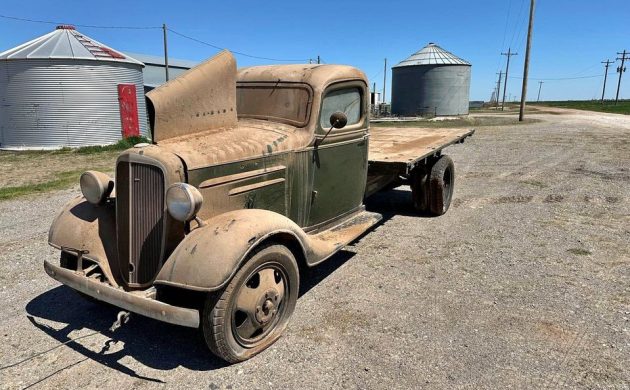
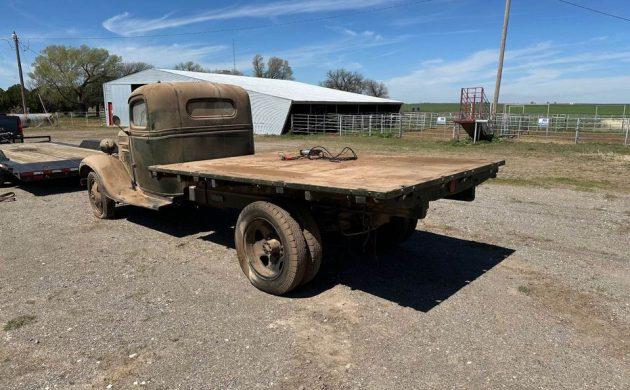

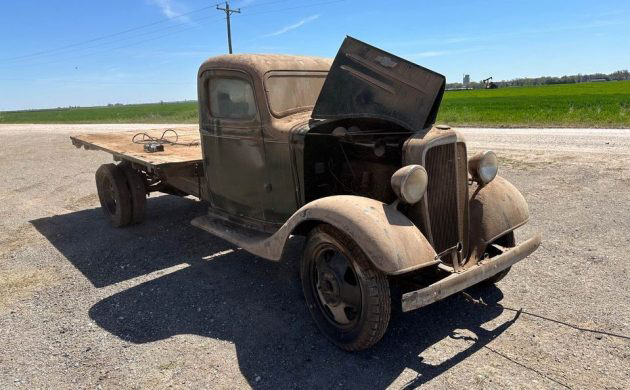
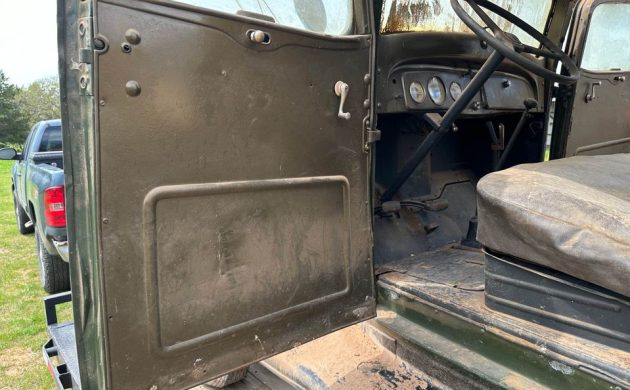

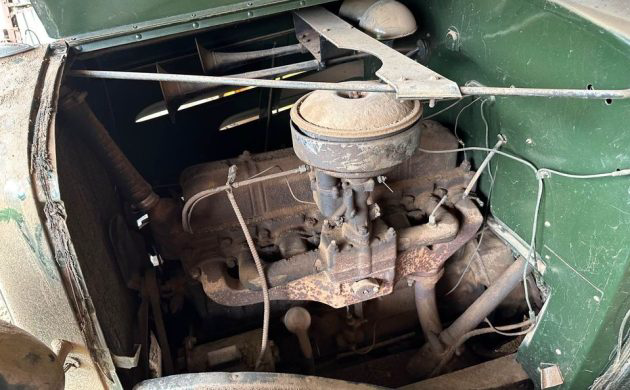



That’s nice! A few of them made it out and about, and some of them survived. This one could surely come to my place and I would think of something good for it to do.
For those who don’t think that one of these, unrestored, would be any good for anything other than yard art there was a local guy, restored a ’29 Chevy 1.5 ton. He showed up at the local machine shop with all the major pieces of an 855 Cummins strapped on the back. There was a major crowd showed up and he had quite a time getting back to the street.
A little curious as to the engine; this one looks more like an early 216. Of course the 216 is fine. It was a major improvement over the 206, At least it ran 4 mains instead of 3. But then the 206 used a forged crankshaft.
Good to have, either way, even if it only tops out at 40 mph…
Look in the background, this is where these trucks reside. As you speed along the lonesome prairie, come across a grain storage facility, tucked away in a corner, was dads, or grand dads truck that probably started the facility back in the 30s. I’m not sure why gas tanks were under the seat. I read, it was an unused portion of the truck, not subjected to road or loading hazards underneath, plus, gas gauges were not reliable, it stopped sloshing, time for gas. For farms, trucks like this were the 2nd biggest purchase, behind the tractor. I can’t find specifics, but a similar Ford was around $800 bucks. Doesn’t sound like much, keeping in mind, a typical house then was $5grand. Farming, historically, has been the lowest paid job in America for a long time, so a purchase of this magnitude, was a big deal.
Not sure what will happen here, it certainly is nice enough to be kept original. Not for any commercial use, but specialty rides, plenty of old timers that would love to have this. I just wonder about the next time around,,, great find, proof positive, they are still out there.
At 61 not sure if I’m an old timer, but if I wasn’t in Nova Scotia, and Turdo didn’t have our dollar so poached, this would be mine. Make it work well, clean it up, and enjoy.
Oh, a real nice set of oak sides would be nice too. Great for Sunday morning coffee with … the rest of the old timers…
Yes, they’re still around. You never know where one might pop up. This one showed up at a wide spot in the road and sat there for a couple of months, until some enterprising individual took it away, hopefully, for a complete restoration. They are a nice-looking truck…
I belong to a site that specializes in old trucks, they are plentiful. I love these old trucks, and plan to add one to my collection soon. But compared with other trucks of similar vintage I believe this one about $10,000.00 over priced in similar condition. restoring an old truck like this requires a start to finish plan, You must determine how much work you can do yourself and how much to be shopped out. The original wheels are a big concern for me , because they are dangerous when changing tires and so forth. I don’t really like the polished aluminum wheels that are so popular but original lookin non split rims painted body color are my option.
God Bless America
Wasn’t truck used in a movie ? The Last Picture Show ?
The Last Picture Show featured a ’40 Chevy pickup that was driven by Timothy Bottoms. I remember a GMC 4400 driving through town on its way to a job. It seems to me that another 4400 tractor unit ran over that kid near the end of the movie…
Yep….saw this on FBM and it’s a little high on price but no better way to start your 401k…..
I recently sold a 1936 1.5 ton Chevrolet wrecker that I had owned for 40 years. It was mostly original, drivable and in good condition. It sold for less than the asking price of this one. So good luck seller.
This truck looks more like a 1.5 ton. I don’t think Chevrolet offered duel wheels on the 1 ton model. The only engine available in 1936 was the Stovebolt 207 so that’s probably what this one is.
Chevrolet redesign their trucks in 1937 and nothing in the drive train from 1936 is interchangeable with 1937 on. That helps make parts for these larger 36 trucks hard to impossible to find. I needed a ujoint and only found 2 in the whole country! (Bought both) I wanted to replace the engine oil distribution unit but never did find one. And the list goes on and on. So good luck buyer.
In all the years I owned mine l only saw two others like it in person. So maybe this one is worth saving. That is if new buyer doesn’t mind losing lots of money starting as soon as it’s loaded on a trailer.
Steven
The engine is a 207. Don’t be confused by the valve cover. In 1936 Chevy redesigned it and although it does not interchange with the 216 cover, it bears a strong resemblance.
The “never fail” give-away is the exhaust manifold. All 207 manifolds dumped the exhaust at the rear while 216 engines dumped their exhaust at the center.